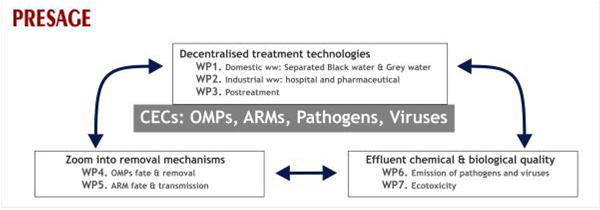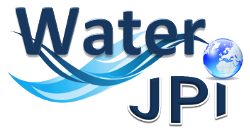PRESAGE
Potential of decentralized wastewater treatment for preventing the spread of antibiotic resistance, organic micropollutants, pathogens and viruses.
 |
||
|
Project coordinator: Francisco Omil - University of Santiago de Compostela (USC) - Spain Communication contact: - Sonia SUAREZ - sonia.suarez(at)usc.es |
||
| Partners: | ||
| Dr Marcelo Zaiat | University of Sao Paulo (USP) | Brazil |
| Prof. Henrik Rasmus Andersen |
Technical University of Denmark (DTU) | Denmark |
| Prof. Luis Melo | University of Porto (UP) | Portugal |
| Mr Eric Pinelli | CNRS / Institut National polytechnique de Toulouse / École Nationale Supérieure Agronomique de Toulouse (INP Toulouse) |
France |
| Prof Thomas Ulrich Berendonk |
Technische Universität Dresden (TU Dresden) |
Germany |
Abstract
New approaches are needed to reduce the emission of contaminants of emerging concern (CECs). Some sources contribute strongly to such emissions, which has driven the focus of PRESAGE on innovative decentralized wastewater treatment (WWT), based on anaerobic and aerobic compact systems.
An integrated analysis of the behaviour of organic micropollutants (OMPs), antibiotic resistant microorganisms and genes (ARMs/ARGs) and pathogens (viruses and bacteria) will be carried out. This will allow a better understanding of the relation between the operational parameters of reactors, the microbiological evolution in the system, the removal of OMPs and pathogens, and the development of ARMs and ARGs. The contribution of such a complex mixture on the final effluent ecotoxicity will be assessed.
The technologies will be validated at 4 demosites treating black and grey water, and effluents from hospitals and an antibiotic industry, in close collaboration with the industrial sector. This high readiness level anticipates a good impact of project results on wastewater innovation.
Experts in the field of advanced WWT, microbiology and ecotoxicology will strongly cooperate and participate in a mobility plan focusing on complementary skills.
PRESAGE impacts society and the economy, boosting the water industry and protecting the environment from effluent discharges containing CECs. In the proposed treatment strategy a minimum global impact is targeted, preferentially promoting the onsite water reuse.
WP structure
|
WP number |
Led by |
WP number |
Led by |
||
| WP1 |
USC |
WP5 | TU Dresden | ||
| WP2 | DTU | WP6 | USC | ||
| WP3 | UP | WP7 | INP Toulouse | ||
| WP4 | USC | ||||
 |
|||||
Expected research results
- Understanding if the enhanced biodegradation of antibiotics in innovative wastewater treatment plants favours the increase or mitigates the prevalence of ARGs in the final effluent
- Assessment of the impact of advanced disinfection processes on the final emission of ARMs and pathogens
- Determination of the effectiveness of decentralized wastewater treatment based on combined biological secondary treatment followed by disinfection, in terms of emission of chemicals of emerging concern and effluent reuse
—
For more details on the work plan and expected impact of the project consult the AquaticPollutants booklet.
—
Keywords: Wastewater treatment, Emerging Pollutants, Pathogens, Antimicrobial Resistance, Aquatic Ecosystems
